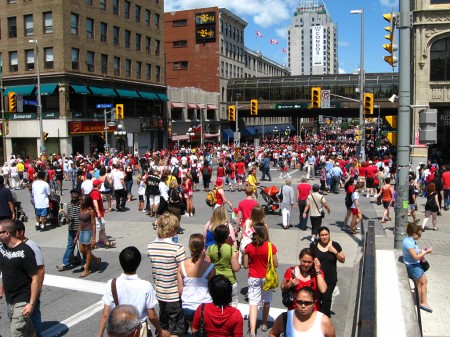The European Union has agreed to start integrating air travel into its emissions trading system. This is a big step, given how the industry has often been excluded from carbon pricing schemes – especially where international travel is involved.
Arguably, the biggest piece of news is that they want to charge non-EU carriers for emission permits when they enter EU countries. This is certainly going to kick up a stink in the WTO and other multilateral trading bodies. That being said, if a global regime of carbon pricing is not to be forthcoming, the regional arrangements will need mechanisms for ensuring that imports meet their standards.
Hashing out how such standards can be applied is sure to be a difficult and extended affair.


I would love to see that WTO case, especially if they apply it differentially based on other countries’ emissions plans: it’s the first carbon tariff.
In 2005, one of my professors predicted that we would never need such a tariff, since eventually the US would implement a reductions scheme, and they would never tolerate the rest of the world having the comparative advantage of pollution – it would bully everyone into binding targets, or even a global trading scheme. I was skeptical, but now it looks like this is getting more and more likely!
EU includes aviation in CO2 curbs
In Europe
The European Parliament backs a law to include aviation in the CO2 Emissions Trading Scheme (ETS) for cutting greenhouse gases.
MEPs voted 640 to 30 for aviation to be included in the scheme from 2012. It includes both EU and non-EU airlines.
“Airlines will have to pay for permits covering 15% of their pollution quotas, the remainder being issued free. “
Canada, EU ink air pact
Last Updated: Wednesday, May 6, 2009 | 3:14 PM ET
CBC News
Canada and the European Union formally signed a deal Wednesday that will liberalize air travel between the two regions and should lead to more trans-Atlantic flights.
Prime Minister Stephen Harper inked the pact with the EU during his summit with European leaders in Prague this week, despite lingering tensions regarding the new ban by the 27 continental countries on Canadian seal products.
“This [agreement] will lower prices and give more choices for people travelling between Canada and Europe,” said the Prime Minister’s Office in a news release announcing the signing.
…
The European Union said the Canadian agreement could mean as many 500,000 more passengers travelling along these routes in the rest of 2009 and a further 3.5 million flyers in the next few years.
All told, the EU expects nine million more people to fly between Canada and the 27 continental nations, an increase of approximately 40 per cent, worth $120 million U.S. in additional economic activity.
Aircraft and emissions
Clean-air turbulence
Europe is right to include airlines in its emissions-trading scheme
FASTEN your seatbelts. From next January, if the European Commission gets its way, carbon dioxide produced by flights into and out of Europe, as well as within it, will come under the European Union’s Emissions Trading Scheme (ETS).
As this will turn a cost now imposed on the environment into a cost on airlines, a lot of those airlines are keen for the commission not to get its way. On July 5th some of them took the matter to the European Court of Justice, saying that in bringing flights from elsewhere into its cap-and-trade scheme, thus requiring that airlines pay for some of their emissions, the EU has gone too far. Some non-European governments, supporting their local airlines, have talked about retaliation, perhaps in the form of a boycott of Europe’s Airbus airliners, for which orders have recently poured in thanks partly to their superior fuel efficiency (see article).